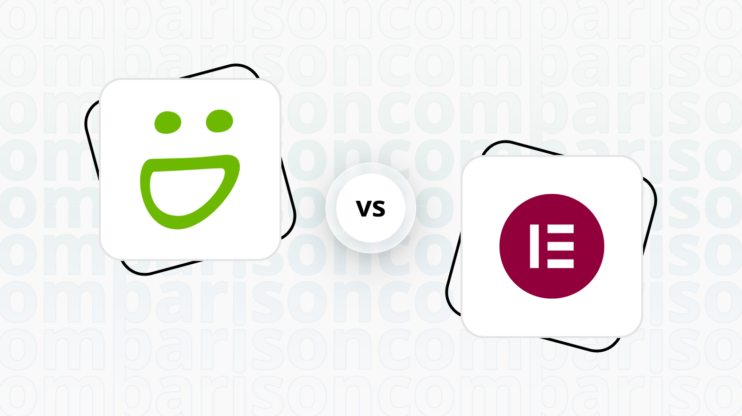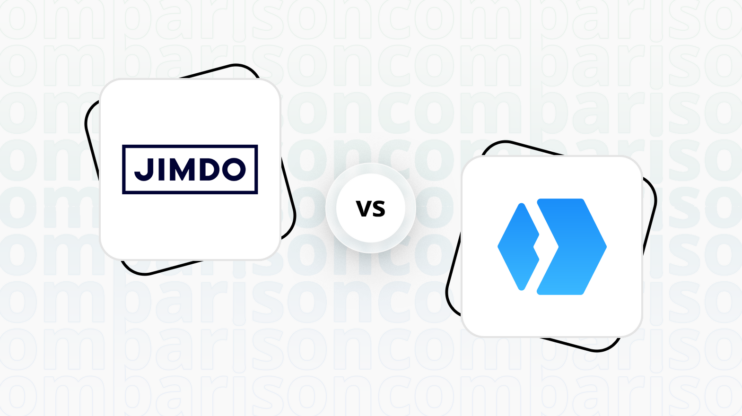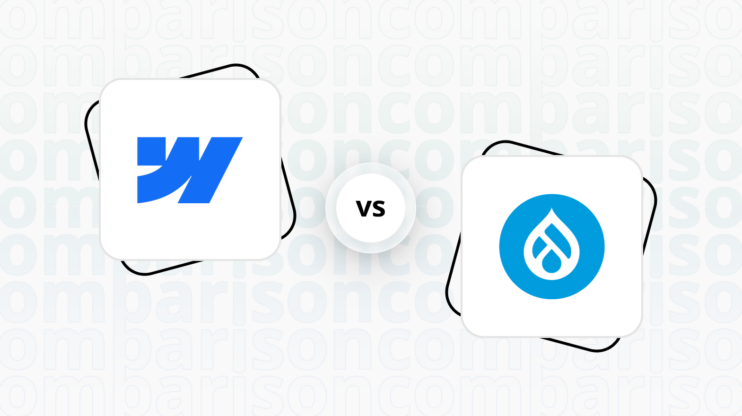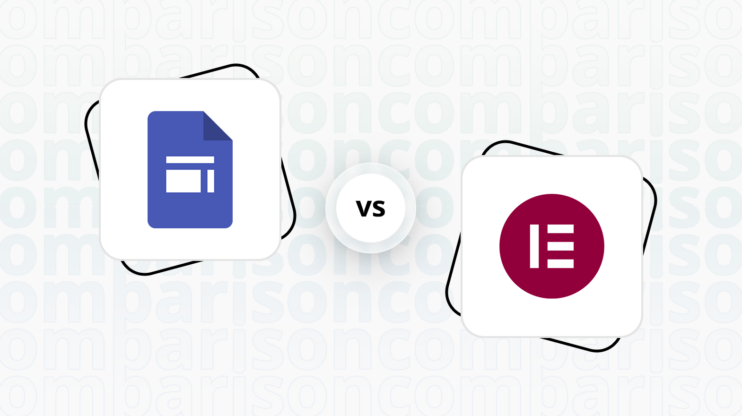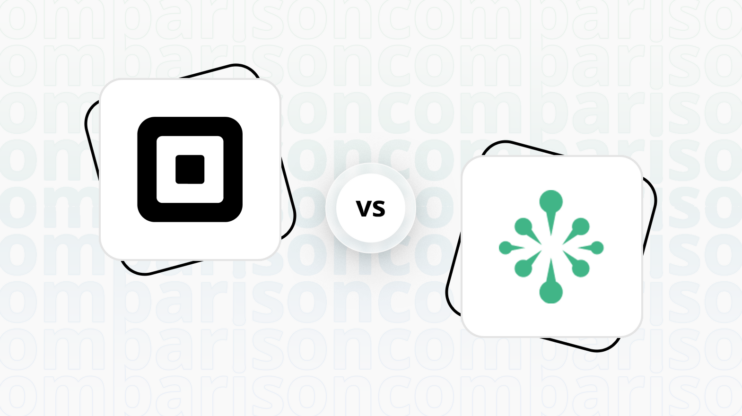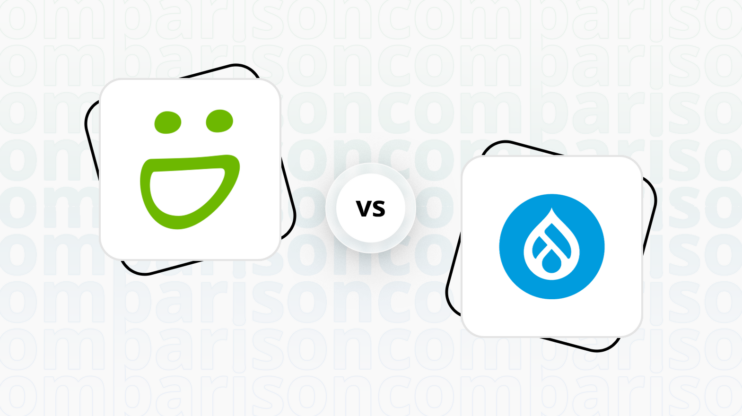Final verdict
Drupal and Webnode both offer unique advantages, catering to different user needs and preferences.
-
Drupal (Overall Grade: 6.4/10)
is a powerful open-source CMS known for its flexibility and extensibility. It is ideal for developers and users who need to create complex websites with custom functionalities. Drupal offers a wide range of modules and themes, making it suitable for various types of websites, from personal blogs to corporate and government sites. However, it has a steeper learning curve and requires more technical knowledge compared to Webnode. -
Webnode (Overall Grade: 6.5/10)
is a user-friendly website builder that allows beginners to create websites quickly and easily without any coding knowledge. It offers a drag-and-drop interface, a variety of templates, and essential ecommerce features. Webnode is perfect for users who prioritize ease of use and need to set up a simple website or online store swiftly. However, it may lack the advanced customization and scalability options that Drupal provides.

|

|
|
|---|---|---|
|
Design functionalities & templates |
7.8 |
7.1 |
|
Ease of use |
5.4 |
8.0 |
|
Ecommerce |
7.5 |
6.3 |
|
Website Editors |
7.5 |
7.3 |
|
Product testing options |
7.1 |
5.3 |
|
Price |
5.7 |
7.7 |
|
Hosting quality |
0 |
6.3 |
|
Website speed optimization |
6.4 |
6.1 |
|
Plugins and integrations |
8.6 |
6.8 |
|
Marketing features |
8.0 |
5.5 |
|
Customer support |
6.7 |
5.3 |
|
Security |
8.3 |
7.7 |
|
AI capabilities |
7.5 |
5.3 |
|
User Management |
9.1 |
6.9 |
Best for ecommerce
 7.5
7.5
 6.3
6.3
Verdict
: Drupal offers a robust and flexible ecommerce solution suitable for complex and large-scale online stores, while Webnode is more suited for beginners and small-scale ecommerce operations.
-
Drupal
: With a score of 7.5, Drupal excels in providing a highly customizable and scalable ecommerce platform through its Drupal Commerce module. It supports extensive product management, payment gateway integration, and customizable workflows, making it ideal for businesses with complex needs. However, its steep learning curve and performance concerns for very large stores may be a drawback for some users. -
Webnode
: Scoring 6.3, Webnode is a user-friendly website builder that offers basic ecommerce functionalities. It is perfect for beginners looking to set up a simple online store quickly. However, its limited customization options and scalability issues may not meet the needs of larger businesses.
Best for informational & business websites
 7.5
7.5
 7.2
7.2
Verdict
: Drupal and Webnode both offer unique advantages for informational and business websites. Drupal, with its extensive customization options and robust security features, is ideal for users who need a highly flexible and secure platform. Webnode, on the other hand, is perfect for beginners looking for an easy-to-use website builder with decent customization options.
-
Drupal
: Drupal is a powerful open-source CMS that excels in flexibility and extensibility, making it suitable for a wide range of websites, from personal blogs to corporate sites. Its extensive range of modules and themes allows for significant customization, and its robust security features make it a reliable choice for users who prioritize security. However, Drupal has a steeper learning curve, which might be challenging for beginners. -
Webnode
: Webnode is a user-friendly website builder that allows users to create websites without any coding knowledge. Its drag-and-drop interface and customizable templates make it easy for beginners to create professional-looking websites quickly. While it may not offer the same level of customization and security as Drupal, Webnode is a great option for those who need a simple and efficient way to build and manage their websites.
Detailed comparison
Design functionalities & templates
Design FunctionalitiesRepresents how well each platform allows for creative design and customization of websites.Score Components:
- Template Variety (30%): Range and quality of design templates.
- Customization (30%): Flexibility and options for design alterations.
- User Interface (20%): Ease and intuitiveness of the design process.
- Responsiveness (10%): Adaptability to different devices and screen sizes.
- Innovation (10%): Unique design features and tools.
 7.8
7.8
 7.1
7.1
🏆
Winner: Drupal.
If you’re looking for a platform that offers more creative control and a wide array of design features, Drupal is the preferred choice.
Drupal, as a highly flexible and powerful content management system, offers a vast array of templates and designs to cater to virtually any website need. With thousands of themes available, users can choose from minimalist designs, industry-specific layouts, and highly customizable multipurpose themes. These templates are designed to be responsive, ensuring that websites look great on any device. Moreover, the Drupal community continuously contributes new designs and templates, expanding the options for users to keep their websites modern and engaging.
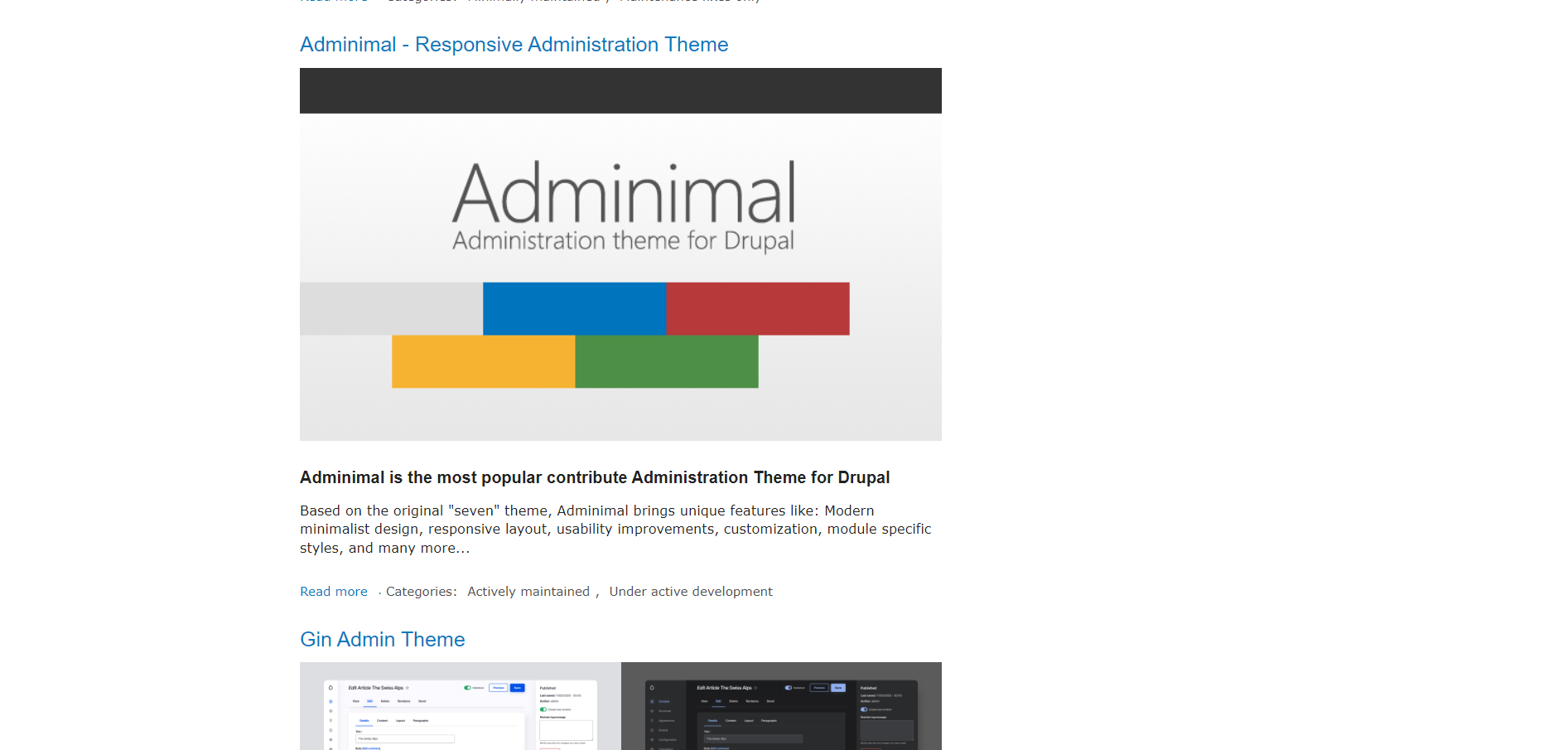
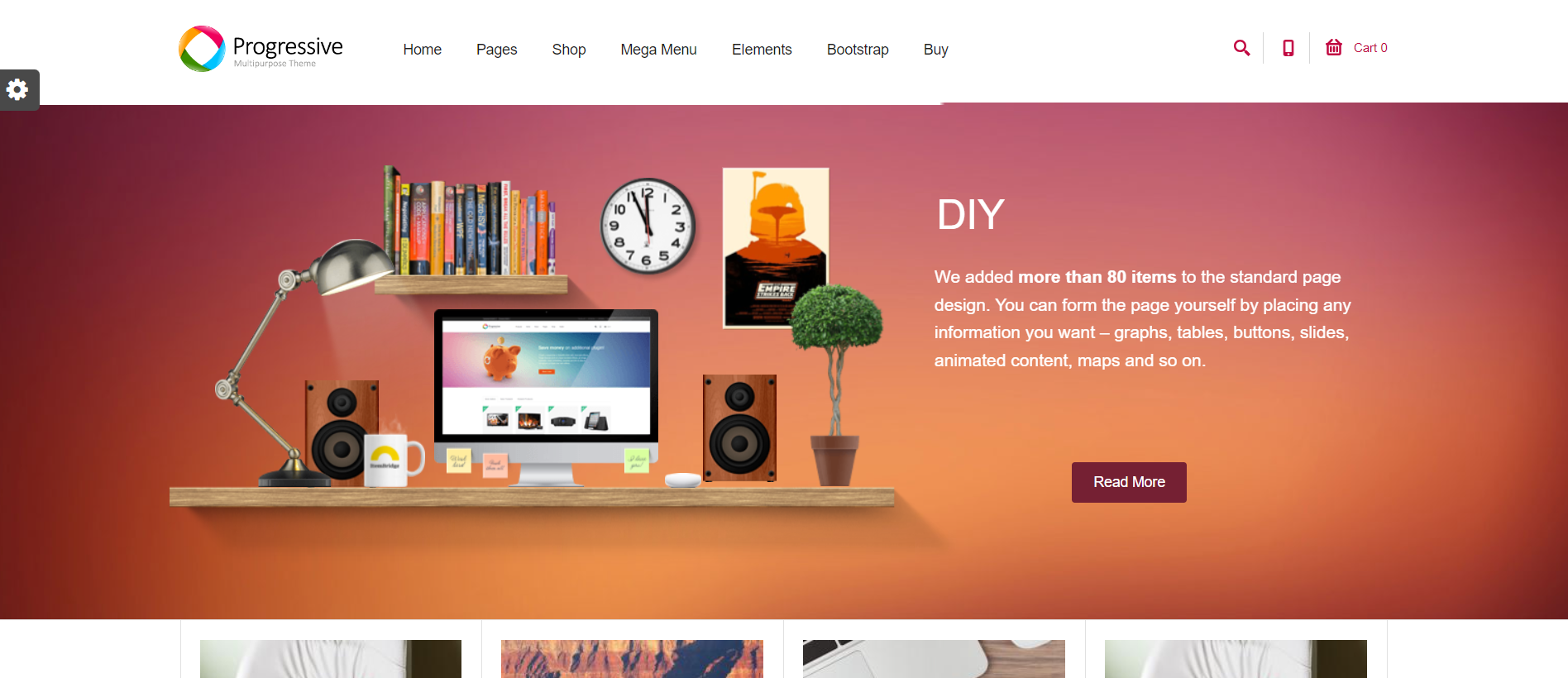
Compared to Drupal, Webnode offers a variety of website templates designed for different purposes, from business and portfolios to restaurants and travel. These templates are customizable and responsive, ensuring they display well on any device. While an exact number isn’t available, Webnode provides a wide selection to cater to diverse website needs.
Get a head start on website creation with AI
Create a custom website tailored to your business needs 10X faster with 10Web AI Website Builder!
Ease of use
Ease of useReflects the platform’s overall user-friendliness.Score
Components:
- Learning curve (40%): Quickness and ease of getting started.
- Interface design (30%): Simplicity and intuitiveness of layout.
- User guidance (20%): Quality of tutorials and support.
- Flexibility (10%): Adaptability to various user skills.
 5.4
5.4
 8.0
8.0
🏆 Winner: Webnode
. Scoring an 8.0, Webnode is praised for its user-friendly website building platform, making it exceptionally easy for beginners to create and manage their websites. Drupal, with a score of 5.4, offers a robust platform but with a steeper learning curve, especially for those new to web development. If ease of use is a priority, Webnode is the clear winner in this category.
Learning Resources
🏆 Winner: Drupal
. While both platforms offer solid learning resources, Drupal goes a step further with its wide array of detailed tutorials and active community forums, making it easier for users to learn and adapt.
For ecommerce
EcommerceMeasures the platform’s effectiveness in supporting online business activities.Score Components:
- Ecommerce themes and templates (20%): Variety and design of templates.
- Product management (25%): Ease of managing and organizing products.
- Payment options (25%): Variety and convenience of payment methods.
- Ecommerce features (20%): Features for managing an ecommerce store.
- Integration (10%): Compatibility with external e-commerce tools and services.
 7.5
7.5
 6.3
6.3
Drupal, with its Drupal Commerce module, offers a flexible ecommerce solution that can be seamlessly integrated into its content management system. It provides a wide array of features including product management, shopping cart, payment gateway integration, and customizable workflows that cater to complex pricing models and product variations. However, it has a steep learning curve for users not familiar with Drupal, and performance can be a concern for very large-scale stores without proper optimization.
Webnode’s ecommerce features include an online store builder, product management tools, various payment options, and basic analytics. However, users may find its customization options limited compared to other platforms, and transaction fees could impact profitability. Integration capabilities may also be constrained, and scalability might be a concern for larger businesses.

|

|
|
|---|---|---|
|
Ecommerce themes and templates |
7.8 |
6.5 |
|
Product page customization |
8.3 |
7.0 |
|
Payment processing and commissions |
7.5 |
6.8 |
|
POS capabilities |
5.5 |
4.0 |
|
Payment gateways |
7.7 |
7.0 |
|
Product numbers |
7.0 |
5.5 |
|
Additional ecommerce features |
8.0 |
6.0 |
Drupal ecommerce features:
- Shopping Cart and Checkout Process
- Payment Gateway Integration
- Order Management and Invoicing
- Tax Calculation and VAT Support
- Shipping and Fulfillment
- Promotions and Discounts
- Reporting and Analytics
- Security and Compliance
Webnode ecommerce features:
- Shipping options
- Payment gateway integrations
- Order management
- Coupons and discounts
Ecommerce themes & templates
Drupal offers a wide array of eCommerce themes designed to cater to different types of online stores, from clean and simple designs to more sophisticated and feature-rich options. These themes are built with responsiveness in mind, ensuring that stores function seamlessly across various devices. Themes like Fiora, DrupalMag, and Storefront highlight the diversity available, offering customization options to match the unique needs of each business.
Webnode offers ecommerce-specific templates designed for creating online stores, though the exact number of templates available may vary over time. These templates typically come with features such as product showcasing, shopping cart functionality, support for various payment gateways, and customization options. However, users should be mindful of potential limitations such as customization restrictions, feature limitations based on plan tiers, transaction fees, and integration limitations when choosing a template and plan for their ecommerce website on Webnode.
Product page customization
Drupal offers extensive customization possibilities for product pages through its modular architecture, allowing for detailed content types, flexible displays with Views, and theme customizations. The Drupal Commerce module enriches e-commerce functionalities, enabling tailored product management, checkout flows, and payment systems. With the ability to develop custom modules, Drupal provides range of possibilities to meet specific e-commerce needs.
Webnode provides users with extensive customization options for product pages, allowing for the creation of visually appealing and informative displays. Through customizable content blocks, product images and galleries, and tailored product descriptions, users can effectively showcase their products. Additionally, features such as customizable call-to-action buttons, product variations, and SEO optimization contribute to a seamless and optimized shopping experience.
Payment processing
Drupal supports a wide range of payment gateways through third-party modules, including popular ones like PayPal, Stripe, and Authorize.Net. These modules enable seamless integration for e-commerce functionalities on Drupal sites. While Drupal itself does not charge any commissions or transaction fees, the individual payment gateways integrated with it do have their own fee structures, which typically include per-transaction charges and may also have monthly fees. The specific fees depend on the chosen payment gateway and the terms of service agreed upon by the website owner.
Webnode website builder supports various payment gateways, including popular options like PayPal and Stripe, for online transactions. While Webnode itself doesn’t charge commissions on transactions, payment gateways may have their own fee structures. Webnode primarily focuses on facilitating online transactions and doesn’t provide native POS capabilities, although integration with third-party POS solutions may be possible. For the latest information on supported payment gateways, transaction fees, and POS integrations, users should refer to Webnode’s official documentation or contact their customer support.
Website Editors
Website EditorsEvaluates the platforms’ website building and editing capabilities.Score Components:
- Customization tools (40%): Range and power of editing features.
- Editor usability (30%): User experience within the editor.
- Design flexibility (20%): Freedom in layout and design changes.
- Update and maintenance ease (10%): Simplicity of updating and maintaining the site.
 7.5
7.5
 7.3
7.3
🏆
Winner: Drupal
. Drupal, with a score of 7.5, offers a wide range of features tailored for content creation and management. It supports rich text editing, enabling users to format text, insert links, images, and media, as well as create tables and lists with ease. The editor is highly customizable, allowing administrators to configure toolbars and options according to the needs of their site. Furthermore, it integrates seamlessly with Drupal’s content management system, supporting features like automatic content saving, version control, and access control, making it a powerful tool for building and managing diverse web content.
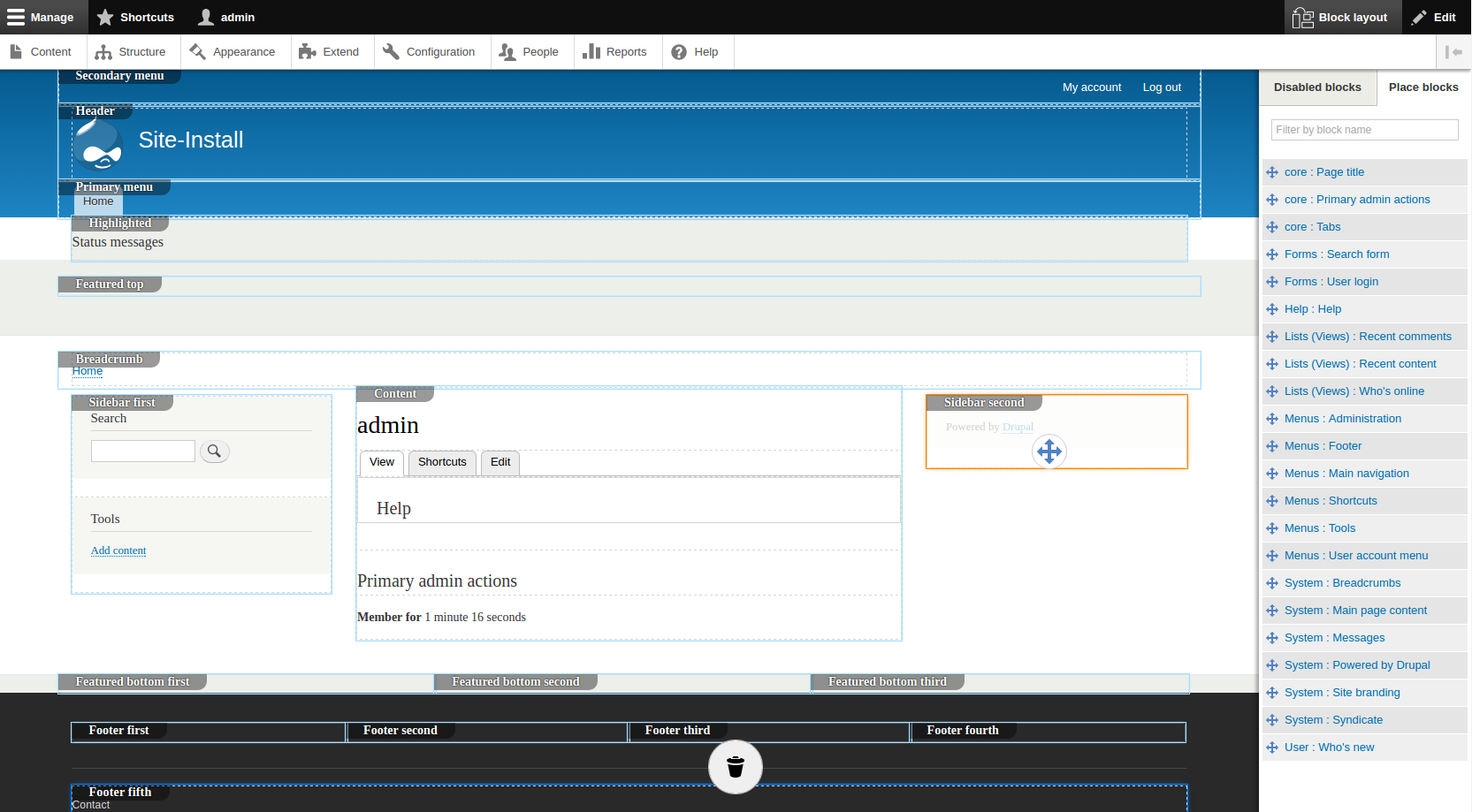
Webnode’s editor, scoring 7.3, features a user-friendly drag-and-drop interface with customizable templates, enabling users to easily create professional-looking websites without coding skills. The editor offers responsive design capabilities and multilingual support, catering to diverse audiences across different devices and languages. Built-in features such as SEO tools, e-commerce functionality, and analytics integration empower users to optimize their websites for search engines, sell products online, and track performance metrics effectively.
Mobile editor/app
 0
0
 5.5
5.5

🏆
Winner: Webnode
. Both Drupal and Webnode do not offer a dedicated mobile editor app. However, Webnode allows users to edit their website using the mobile browser version of the editor, although it comes with certain limitations. This gives Webnode an edge over Drupal, which does not provide any mobile editing capabilities. Therefore, if mobile editing is a priority for you, Webnode would be a better choice.
Product testing options
Product Testing OptionsAssesses the options for trying out platform features before commitment.Score Components:
- Trial quality (40%): Extent and usefulness of the trial or free version.
- Feature accessibility (30%): How many features are available to test.
- Trial duration (20%): Length of the trial period.
- Ease of transition (10%): Smoothness of moving from trial to paid plans.
 7.1
7.1
 5.3
5.3
Overall Result
:
Drupal Wins
. Drupal scores 7.1 in product testing options, while Webnode scores 5.3. Drupal, being an open-source CMS, is free to use and allows users to explore its functionalities without any time limit. However, it doesn’t offer a trial version or the possibility to test premium features. Webnode, on the other hand, offers a free plan with some limitations and doesn’t provide a trial version. Some premium features can be tested with the free plan, and they also offer a 15-day money-back guarantee.

|

|
|
|---|---|---|
|
Free Plan |
Yes (open-source software) |
Yes |
|
Trial Duration |
No | No |
|
Testing Premium Features |
No | Some features can be tested with the free plan |
|
Money Back Guarantee |
No payments required | 15-day money back guarantee |
Price
PriceLooks at the cost-effectiveness and value for money of each platform.Score Components:
- Plan value (40%): What each pricing tier offers.
- Transparency and clarity (30%): Clearness of pricing structures.
- Flexibility of plans (20%): Range of options to suit different budgets.
- Hidden costs (10%): Additional expenses not included in the plan.
 5.7
5.7
 7.7
7.7
Webnode offers a range of paid plans with varying features, while Drupal is free but requires separate purchases for domain, web hosting, and website builder subscriptions. Neither platform offers enterprise plans.

|

|
|
|---|---|---|
|
$0-$10 |
No offering at this amount. |
LIMITED ($5.50/month): Basic plan, 200 MB storage, attach domain, website statistics, up to 5 form fields, last 30 days backup. This plan allows to manage 1 website with unlimited number of pages. Value for price: 3.0 |
|
$10-$20 |
No offering at this amount. |
MINI ($10.00/month): All essentials for a simple website, 1 GB storage, 3 GB bandwidth, website statistics, 1 email account. This plan allows to manage 1 website with unlimited number of pages. Value for price: 4.5 |
|
$20-$30 |
No offering at this amount. |
STANDARD ($16.90/month): For starting an online store, 3 GB storage, 10 GB bandwidth, 20 email accounts, basic store features. This plan allows to manage 1 website with unlimited number of pages. Value for price: 6.0 |
|
$30+ |
No offering at this amount. |
PROFI ($26.50/month): Professional websites, 7 GB storage, unlimited bandwidth, 100 email accounts, full online store capabilities. This plan allows to manage 1 website with unlimited number of pages. Value for Price: 7.5 |
location. As a result in rare cases the prices displayed here can differ from the ones you see on their
websites.
Hosting quality
Hosting
qualityExamines the reliability and performance of the hosting solutions.Score Components:
- Uptime (40%): Consistency and reliability of website availability.
- Speed (30%): Loading times and performance.
- Bandwidth and storage (20%): Sufficiency of resources provided.
- Data centers (10%): Quality and distribution of hosting infrastructure.
 0
0
 6.3
6.3
Winner: Webnode
. Webnode offers direct hosting services with varying bandwidth depending on the plan, and an uptime of 99.6%. Drupal, being an open-source CMS, does not provide hosting services directly, and the uptime, type of hosting, and data centers depend on the chosen hosting provider. Despite the lack of transparency about its hosting type and data center locations, Webnode scores higher in Hosting Quality due to its direct hosting services.

|

|
|
|---|---|---|
|
Do they offer hosting? |
No | Yes |
|
Data Centers: |
Depends on hosting provider | Not disclosed |
|
Type of hosting: |
Depends on hosting provider | Not disclosed |
|
Uptime: |
Depends on hosting provider | 99.6% |
|
Uptime Guarantee: |
Depends on hosting provider | No |
Website Speed Optimization
Website Speed OptimizationEvaluates optimization of website loading timesScore Components:
- PageSpeed Score (30%): Google’s score indicating performance optimization.
- Loading Time (30%): The average time until a website is fully interactive.
- Mobile Optimization (15%): Optimization effectiveness for mobile devices.
- Resource Optimization (15%): Optimizing images, scripts, and other heavy resources.
- CDN Usage (10%): Use of CDN to enhance speed across geolocations.
 6.4
6.4
 6.1
6.1
🏆 Winner: Drupal
Both Drupal and Webnode have strategies in place for website speed optimization, but Drupal’s open-source nature and extensive guides and tutorials give it an edge over Webnode.

|

|
|
|---|---|---|
|
Focus |
Extensive guides and tutorials |
Code Minification, Image Optimization, Caching |
|
Performance Tools |
User-dependent |
User-dependent |
|
Key Strategies |
Users can optimize almost all aspects of their website |
Code Minification, Image Optimization, Caching |
|
Load Times |
Varies depending on optimization and website complexity |
Varies depending on optimization |
|
Page Speed Scores Range |
Varies depending on optimization and website complexity |
Varies depending on optimization |
|
Core Web Vitals Improvement |
Depends on users |
No information provided |
Drupal, an open-source content management system, offers numerous guides and tutorials on speed optimization, allowing users to optimize almost all aspects of their website. The load times and PageSpeed scores vary depending on the level of optimization and the complexity of the website. The improvement in Core Web Vitals also depends on the users, as they have the flexibility to make changes to their website.
On the other hand, Webnode, a website builder, focuses on code minification, image optimization, and caching for speed optimization. Like Drupal, the load times and PageSpeed scores vary depending on the level of optimization. However, Webnode does not provide any information on their Core Web Vitals improvements.
Get a head start on website creation with AI
Create a custom website tailored to your business needs 10X faster with 10Web AI Website Builder!
Plugins and integrations
Plugins and integrationsMeasures the range and effectiveness of additional plugins and integrations.Score Components:
- Variety of options (40%): Range of available add-ons.
- Integration smoothness (30%): Ease of integrating plugins into the site.
- Quality of plugins (20%): Functionality and reliability of the options.
- Custom integration capabilities (10%): Support for custom or third-party integrations.
 8.6
8.6
 6.8
6.8
🏆 Winner: Drupal.
With a score of 8.6, Drupal leads the way with its extensive range of over 51,000 modules that are designed to enhance and tailor Drupal applications to specific needs. Webnode, with a score of 6.8, offers a variety of plugins developed by Elfsight, aiming to enhance website functionality, improve user engagement, and drive conversions. However, Drupal’s extensive range of modules and its higher score makes it the winner in this category.
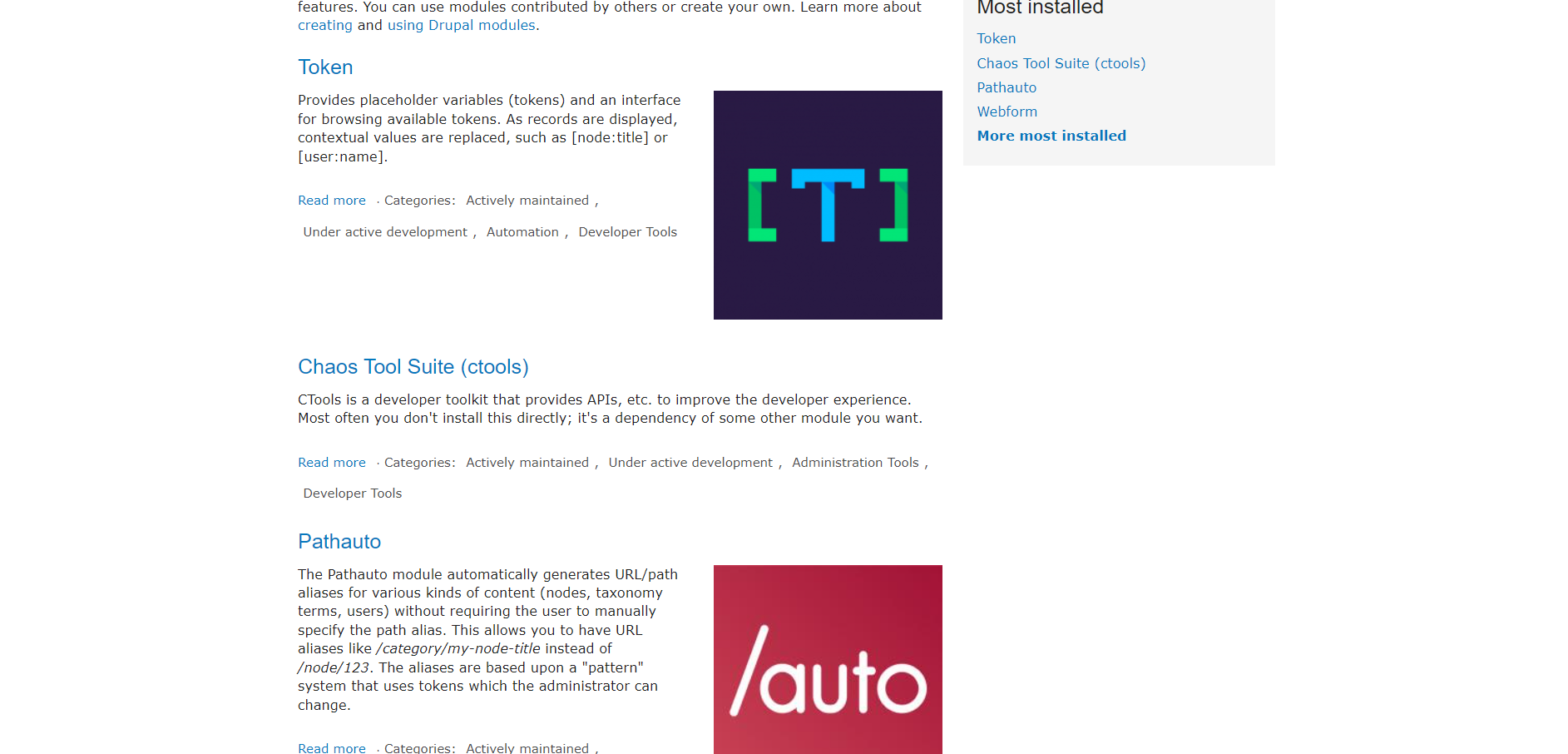

Marketing Features
Design FunctionalitiesRepresents how well each platform allows for creative design and customization of websites.Score Components:
- Template Variety (30%): Range and quality of design templates.
- Customization (30%): Flexibility and options for design alterations.
- User Interface (20%): Ease and intuitiveness of the design process.
- Responsiveness (10%): Adaptability to different devices and screen sizes.
- Innovation (10%): Unique design features and tools.
 8.0
8.0
 5.5
5.5
🏆
Overall Winner: Drupal
. Drupal stands out for its flexibility and extensibility, enabling developers to create complex websites with custom functionalities. Webnode is a good option for beginners who want to create a simple website quickly and easily.

|

|
|
|---|---|---|
|
SEO Tools |
Yes, with SEO modules such as Yoast SEO |
Yes |
|
Email Marketing |
Yes, but with third-party extensions, such as MailChimp |
Yes |
|
Blogging |
Yes |
Yes |
|
Social Media Integration |
Yes |
Yes, through third party integration |
|
Analytics and Reporting |
Yes, basic built-in features, and Google Analytics integrations through modules |
Yes |
|
Ads and Promotions |
Yes, but with third-party extensions |
Yes |
Customer Support
Customer supportEvaluates the quality and availability of support options.Score Components:
- Response time (40%): Speed of support responses.
- Support quality (30%): Effectiveness and helpfulness of the support.
- Availability (20%): Range of support channels (phone, chat, email).
- Resource richness (10%): Quality of self-help and educational materials.
 6.7
6.7
 5.3
5.3
🏆 Winner: Drupal
. In the Drupal vs Webnode comparison, Drupal takes the lead with its extensive community support system and professional 24/7 support services. Drupal users benefit from a robust community on Drupal.org, which offers forums and documentation. Additionally, professional support services like those from Drupal Connect and GreenGeeks provide flexible and comprehensive assistance, ensuring users have access to help whenever needed.
Webnode, on the other hand, offers customer support in over 20 languages, available five days a week. While email support is the primary channel, premium users receive priority phone support. However, the lack of general phone and live chat support, combined with limited availability during weekdays, makes Webnode’s support less accessible compared to Drupal’s round-the-clock professional services.
Security
SecurityLooks at the platforms’ security measures and data protection.Score Components:
- Data protection (40%): Safeguards for user and customer data.
- SSL and encryption (30%): Implementation of secure connections.
- Compliance (20%): Adherence to industry security standards.
- Regular updates (10%): Frequency of security updates and patches.
 8.3
8.3
 7.7
7.7
🏆
Winner: Drupal
. Drupal’s security measures are comprehensive and robust, offering a wide range of features to protect websites and user data. These include regular updates, advanced security features like two-factor authentication, and a dedicated security team. Drupal’s proactive approach to security, coupled with its flexibility and extensibility, makes it a strong choice for users who prioritize security.
Webnode, while offering a variety of security measures such as HTTPS and GDPR compliance, does not match the comprehensive security features provided by Drupal. However, it does offer a Premium Site Security add-on for users who want to enhance their site’s security. Overall, Webnode is a good option for beginners who want to create a simple, secure website quickly and easily.
AI Capabilities
AI capabilitiesMeasures the effectiveness of AI-driven features and tools.Score Components:
- Automation efficiency (40%): Impact of AI on streamlining processes.
- Personalization (30%): AI-driven customization for users or customers.
- AI-Assisted design (20%): Role of AI in website design and functionality.
- Data analysis (10%): Use of AI in interpreting user data and analytics.
 7.5
7.5
 5.3
5.3

|

|
|
|---|---|---|
|
AI Builder |
|
Webnode AI builder streamlines the website creation process |
|
AI Ecommerce Features |
Chatbots, content creation, marketing automation, cognitive services |
|
|
AI Content Generation |
AI Connect, OpenAI and ChatGPT integration for content generation and SEO optimization |
|
|
Additional AI Features |
AI-based search enhancements, content personalization, automated content moderation, language translation, content localization, accessibility improvements |
|
🏆 Winner: Drupal
. Despite not having an AI builder, Drupal’s AI capabilities are more comprehensive, enhancing various functionalities such as e-commerce, content creation, and marketing automation. It also offers additional AI features like AI-based search enhancements, content personalization, automated content moderation, language translation, content localization, and accessibility improvements. On the other hand, Webnode only offers an AI builder and lacks other AI features.
User Management
User ManagementAssesses the platforms’ capabilities in managing user roles, permissions, and accessibility.Score Components:
- Role Customization (40%): Flexibility in creating and defining user roles and
permissions. - Ease of Management (30%): User interface and tools for managing users.
- Access Control (20%): Effectiveness of access control measures for different user
levels. - Scalability (10%): Ability to manage a growing number of users efficiently.
 9.1
9.1
 6.9
6.9
🏆 Winner: Drupal
. Drupal’s flexible permission and role system allows for an unlimited number of users to manage and edit a website, only constrained by server capacity and practical management considerations. Webnode, on the other hand, limits the number of users depending on the subscription plan.
Drupal User Roles and Access Levels:
| Role | Description | Access Highlights |
|---|---|---|
| Editor | Users responsible for content creation, editing, and publishing. | Can create, edit, delete, and publish content; can also manage comments. |
| Moderator | Users focused on site moderation, including comment and user management. | Can approve or delete comments, block users, and manage reported content. |
| Administrator | Users with full access to all administrative features of the site. | Can change site configuration, manage all content, users, permissions, and install modules/themes. |
Webnode User Roles and Access Levels:
| Role | Description | Access Highlights |
|---|---|---|
| Website Owner | The individual or entity that owns the Webnode website. | Full access: can modify site structure, design, content, and manage user roles. |
| Administrator | Users with administrative privileges assigned by the website owner. | Nearly full access, including content management, and some settings adjustments. |
| Editor | Users tasked with creating, editing, and publishing content. | Access to add and edit content, blog posts, and pages, but cannot alter design. |
| Contributor | Users who can contribute content but cannot publish it. | Can draft content but need approval from an Editor or Administrator to publish. |
| Viewer/Visitor | Individuals who visit the website without any editing permissions. | Can view the public website and interact through comments or contact forms. |
| E-commerce Manager | Specifically for websites with an e-commerce component, managing products. | Can add, edit, and manage products, orders, and customer interactions. |
Additional Features

|

|
|
|---|---|---|
|
SSL Certificate |
|
|
|
Custom Domain |
|
|
|
Free Custom Domain Included |
|
|
|
International Domains |
|
|
|
Mobile Responsive |
|
|
|
Page Speed |
|
|
|
Website Builder Mobile App |
|
|
|
Convert a Website To An App |
|
|
|
Website Analytics |
|
|
|
Multilingual Sites |
|
|
|
Multiple Users |
|
|
User Feedback
Users appreciate Drupal for its ease of use, security, and flexibility as an open-source CMS, highlighting its ability to scale and support a variety of websites and applications with modern technology tools. The community and documentation are frequently mentioned positives, providing ample support and resources. However, criticisms include a relative lack of plugins and themes compared to competitors like WordPress, the learning curve for customization without coding, and some challenges with installation and updates. The platform is praised for its robust content management capabilities, enabling users to manage content and user access efficiently. Overall, feedback underscores Drupal’s strength in creating secure, customizable, and scalable web solutions, despite some desires for more intuitive UI and easier setup.
User feedback on Webnode highlights its ease of use, rapid website creation capabilities, and the wide range of templates available, making it a popular choice for individuals and businesses seeking an intuitive web development platform. While praised for its user-friendly interface and quick setup, including domain purchase and application, some users express a desire for more flexibility and customization options, especially in themes and e-commerce features. Comparatively, it falls short on advanced functionalities such as SEO tools and widgets offered by competitors like WordPress. Customer service experiences vary, with some users facing challenges in getting support for email hosting and analytics integration. Overall, Webnode is celebrated for its ability to accommodate users with little to no coding knowledge, offering an accessible solution for creating professional websites, though it may not fully meet the needs of those requiring more complex site features or dedicated customer support.
The making of this blog
We followed a clear, step-by-step process to write and research this article.
FAQ
Which platform is better for beginners, Drupal or Webnode?
Can I use both Drupal and Webnode for ecommerce?
How do Drupal and Webnode compare in terms of customization and design?
What are the major differences in pricing between Drupal and Webnode?
Which platform offers better customer support, Drupal or Webnode?
Are Drupal and Webnode equally secure?
Which platform is more suitable for creating multilingual sites?










